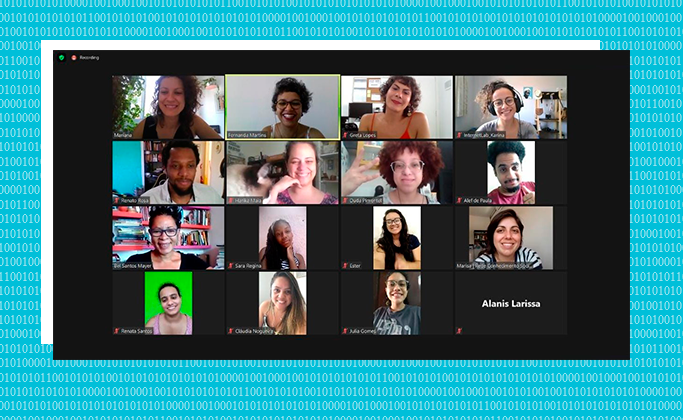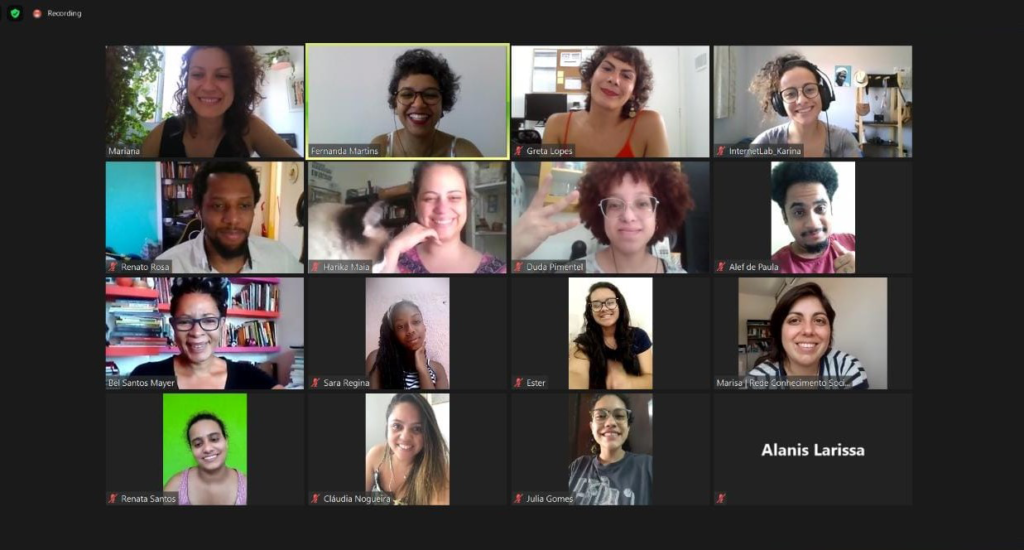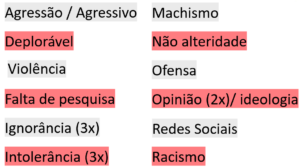
Recognize, Resist, Remedy: hate against women on the internet and youth
From March to December 2020, in partnership with the Social Knowledge Network and IBEAC, InternetLab held workshops aimed at 16 to 25 year olds, in order to make visible and denaturalize the hate speech online aimed at women.
By Fernanda K. Martins and Mariana Valente

With the growth of discussions about the importance of considering the way hate speech occurs in the online sphere and how it is aimed at groups historically seen as second class, InternetLab has been engaged in understanding, since 2018, how hate speech against women is understood socially and legally. This initiative has the support of the International Development Research Center and is part of a partnership with the institution IT for Change, which, in India, deals with similar questions to those we have been dealing with here.
Among the various activities of the project, one line is to understand, through participatory research, how youth perceives this theme. Is hate speech against women seen as acceptable behavior? Do men and women feel directly affected by the issue?
To this end, partnerships were made with the Social Knowledge Network, an organization specialized in participatory research initiatives, and with IBEAC, which works to promote rights and citizenship in various areas in the city of São Paulo. Workshops were also organized (online) from March to December 2020, together with 14 young people living in different peripheral territories in the metropolitan region of São Paulo. At each meeting, the young people left with a “mission”.
In addition to the exchanges established, which are fundamental to constructing answers to the initial questions, the idea was that they would also have the experience of becoming researchers on the subject throughout the process and could thus ask new questions. Throughout the first meetings, we sought to connect the views that were presented by them and the concepts of hate speech found in the literature, which was also done with an analysis of the policies of the internet platforms and their applications.

Young people interview
Between August and September, the participants had the mission of conducting at least two in-depth interviews with people of different profiles (with regard to age, gender, ethnic-racial belonging and social class). They were the ones who autonomously developed the scripts for the interviews, the recording of the audios and the transcriptions, with the support of the teams of the partner institutions. The Social Knowledge Network, in particular, offered training on how to ask questions that do not direct the answers, developed a table of profiles, explained the IBGE criteria for determining social class in Brazil and assisted in coding the interviews.
Alef Santos, one of the young researchers, said, in an article by Repórter Justiça, about how this process of talking to people about the topic felt. In his words, “we have been doing interviews […] with all classes, all colors, so we can discover […] what these people think about this topic, if they have any solution. And I believe that the feedback from the interviews was surprising, because they were extraordinary responses and based on these responses we are now looking for ways to combat this discourse”.
Many interesting points emerged from these interviews; among them, it was noted that many interviewees considered it the exclusive responsibility of women: many stressed the importance of women preserving their images on social networks to avoid violent situations. Another point was that most of those who were heard were unaware of the hate speech policies of the platforms themselves, such as Facebook, Instagram, YouTube and Twitter.

Duda Pimentel, one of the young researchers, also in an interview with Repórter Justiça, stated that “It is very important to talk about this because, unfortunately, hate speech, harassment on social networks is very normalized in our society […] we don’t notice it sometimes and, when you get deeper into the subject, you see a lot that happens every day, every minute, especially with women…”.
Developments
As Alef mentioned above, the group was thinking of ways to combat hate speech against women online. From the experiences of deepening and analyzing the interviews, the young people were divided into groups and mentored by professionals experienced in the development of cultural projects, in order to develop intervention proposals.
The groups’ decision, based on reflections on the responses that came in, was to mount three projects: one aimed at women under 40, another at women over 40, and another at men of all ages. In the execution phase, the projects will be launched in the first quarter of 2021, in the multiple spaces and platforms where they are scheduled to occur. Follow our website and social networks to get to know them.